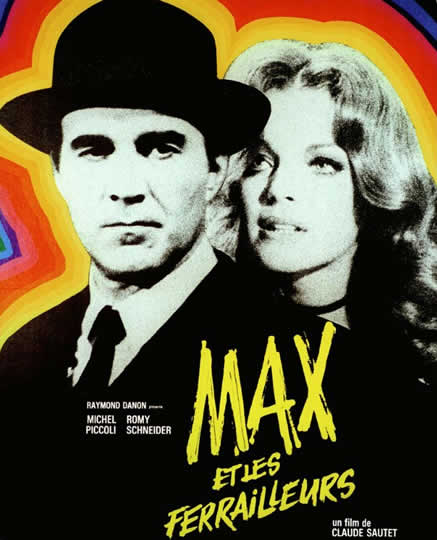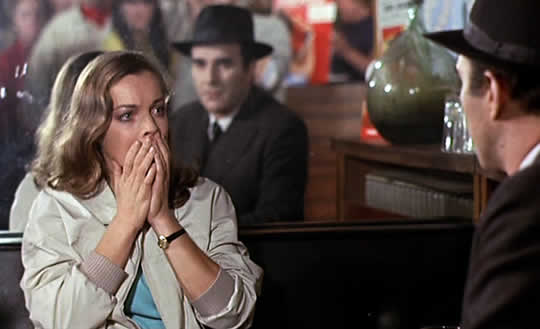 Finally released in the US, Claude Sautet’s 1971 “Max and The Junkmen” has more in common with American anti-hero detective and police procedurals of that era than it’s French counterparts. Early Sautet films, like the Italo-French crime film “Classes tout risques” (available from Criterion), and the hard to find gunrunning adventioner “L’arme au Gauches” had more muscle than his later more bourguois films.
Finally released in the US, Claude Sautet’s 1971 “Max and The Junkmen” has more in common with American anti-hero detective and police procedurals of that era than it’s French counterparts. Early Sautet films, like the Italo-French crime film “Classes tout risques” (available from Criterion), and the hard to find gunrunning adventioner “L’arme au Gauches” had more muscle than his later more bourguois films.
The subtle Michel Piccoli plays Max, a willfully independent ex-Judge turned cop, who, as the son of provincial vintners, can afford to go his own way. Max joins a long tradition of independently wealthy, gentleman detectives including: Sherlock Holmes, The Falcon, The Saint, Philo Vance and Nick Charles, But unlike his forbears, he is willing to game the system to get results. He’s a ‘real-politic cynic like Serpico, Popeye Doyle and Dirty Harry. The former district judge, furious at watching known felons go free, took up the badge; but a string of equally frustrating cases, which culminated in convicted crooks doing short time, has left him obsessed with catching perpetrators In the act. His reputation hangs in the balance.
Tailing a used car thief, he realizes it’s his Army buddy Abel Maresco (Bernard Fresson). Abel recognizes Max and invites him for a drink. But their chatty reunion doesn’t deter Max from his corrupt entrapment. A telephoto montage tracks the hapless petty thieves Max is targeting. The sequence, seamlessly edited by Jacqueline Thiédot, establishes the eccentric gang members through behavior as each is captured in a cop’s surveillance camera. An amusing narration describes their two-bit criminal past.
The junkmen, low-level losers who trade in stolen reels of phone wire and the occasional stolen car seem beneath contempt, but, using Abel’s girlfriend, hooker ‘Lily’ (Romy Schneider) Max tempts them to hit a local bank on the day the local butchers deposit their payroll.
In a sort of bleak comedy, puppet master Max worries weather his lazy lay about gang, who’d prefer to drink and play cards, can actually pull off an armed robbery. Lily and Max have something in common: each chose to work their profession on their own terms. Rescued from Germany by Abel, Julia Anna Ackermann / ‘Lily’ returns to hooking as an independent, sans pimp.
In order to plant the seeds, Max becomes one of Lily’s regulars, posing as the manager of the local bank branch. But intercourse is not on the menu. Max pays simply her for her company. Their odd trysts involve meals, sleepovers, sexy photos in her bath, all of which builds trust and intimacy. 
But in a performance of subtle nuance, we notice cool Max’s emerging emotional involvement, little expressions flicker across his face. Piccoli, like Mastroianni and Guinness, is able to exude complex emotions with subtle devices. All of these actors achieve audience empathy for their characters’ oft-dubious behavior: their melancholic eyes, shaded with ambiguity, call to us across a moral divide.
Romy Schneider is wry and seductive as Lily, Schnieder, who died at 43, frequently worked with Sautet (five films) and Piccoli (Sautet’s “Les choses de la vie” & “Mado”) and “Le Trio infernal”, “Chimney # 4.”
Music by the great Philippe Sarde pulses through the film. Cinematographer René Mathelin’s grainy backstairs Paris, the arrondissements we don’t usually see, the junkyard in the Western suburb of Nanterres, the small bank branch targeting for the robbery, the drab precinct house, all contrast with Max’s rented pied-à-terre, where he and Lily play house.
In Suatet’s clever script, Max slowly drifts towards moral indefensibility, It’s not just intimate betrayal he’s on about, It’s the common definition of justice. Determined to catch his perps in the act, Max singlehandedly manufactures a crime. Only his Chief (Georges Wilson) discovers what’s up. Max controls the would be bank robbers, the surveillance investigation and the local piece force, but has a nemesis, punctilious Rosinsky (François Périer) Police Chief of the district where the bank branch is located. Believing Max is working from a tip, unaware that Max is the mastermind, Rosinsky has his own ideas about how the arrest will go down. In the end, Rosinsky rounds ups up probable accomplices of the failed robbery and Max sacrifices himself to set Lily free.

